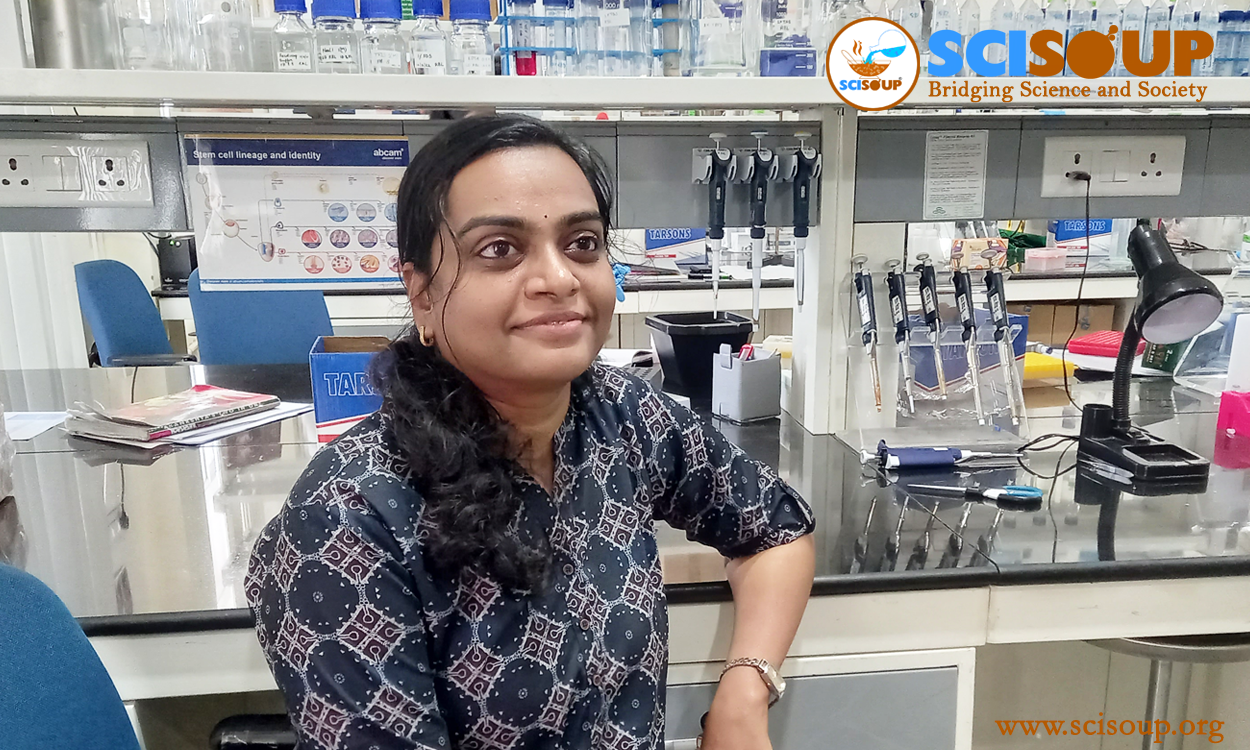
Embarking on an independent scientific journey as an academician heading an independent research group with teaching responsibilities comes with a set of unique challenges. Each person has a unique way of navigating this path. The background preparation and strategies one employs to get into an academia based position are also varied. As a part of SciSoup Blog Series, we have tried to collate a questionnaire that various young investigators and early career researchers have responded to and we hope that this brings in new perspectives, ideas and helps aspiring young researchers who are planning to take this path and embark on this exciting journey ahead.
APR 14, 2022 | BY ROHAN J. KHADILKAR
In this fourth mentoring Blog post, we would be sharing with you the views and experiences of Dr. Ruthrotha Selvi Bharathavikru. Dr. Selvi is an Assistant Professor at IISER Berhampur, since August 2019. Her research group, RNA Nucleo-Protein Biology Lab (RBL) is working on RNA Binding Proteins and their role in Stem Cell Biology. Dr. Selvi has done her Doctoral studies from Transcription and Disease Laboratory, Molecular Biology and Genetics Unit, Jawaharlal Nehru Centre for Advanced Scientific Research, Bengaluru, working with Professor Tapas Kundu, on chromatin modifications in differentiation and disease. She did her postdoctoral research at the MRC-Human Genetics Unit, Edinburgh, working with Professor Nick Hastie on post transcriptional regulatory cascades in nephrogenesis. Dr. Selvi is a Ramalingaswami Fellow, a recipient of the Merck-Millipore Innovation Award and the Ranbaxy Young Scientist Award.
When, not in the lab or in a classroom, Dr. Selvi, tries to catch up with reading. She is an avid reader of classics, loves baking, and is a travel enthusiast. She has been associated with several outreach activities since her PhD days, and is a firm believer in the Amiel philosophy that Society develops by Science.
1) How was the transition like from being a postdoctoral fellow to an independent investigator and leading a research group?
I had been fortunate that my postdoctoral mentor had factored in this transition by letting me supervise a small subgroup within the research group during my tenure. However, it has been a steep learning curve as an independent investigator.
2) What advice and tips you would provide to a person who is planning on transitioning to academia and is on the academic job market?
1. Planning, short term and long term goals
2. Networking, building a strong and supportive network of mentors, peer group
3. Resilience, which I believe is the most important strategy, since whoever opts for staying on in the academic arena, is going to need this throughout.
3) What are some of the specific challenges you faced while setting up your own lab and starting a new research group?
I believe, most of us who started their research group at the end of 2019, have faced the same set of challenges in the form of the pandemic. Something that has been truly challenging was understanding the procurement process, there are still terminologies and abbreviations, which truly test your academic and research training. It makes me wonder if there could be a separate dictionary for the procurement process!
4) Which are some of the fellowships/grants that an early career researcher in India can apply for in order to kick start their career?
SERB Start up Research Grant (SRG) and the DBT Ramalingaswami Re-entry Fellowships, DST-INSPIRE fellowships are all very good and useful early career researcher oriented grants.
5) Your thoughts on teaching, mentorship and its role in shaping curious minds?
As a researcher, I had been previously associated with postgraduate trainees and PhD students were the mentoring was mostly oriented towards research. However, now, being at IISER, with undergraduate teaching being an important facet, I have realized the significance of communication, accessibility and inculcating the ability to think and reason as key components of teaching and mentorship.
6) If you were to share your life philosophy or “mantra” that you believe in the most that also helps you in 'sciencing', what would it be?
One of the 'mantras' that has kept me going has been 'Live in the present, since the journey is more important than the destination'. This might sound like a quote from a session on Mindfulness, but it has been really helpful in 'Sciencing'. We as a research group have set weekly and fortnightly research goals and celebrate the success of achieving it. This helps us in putting forward realistic goals and work towards it. And ultimately each small goal is towards a larger question (the destination!).
Dr. Ruthrotha Selvi Bharathavikru was interviewed by Dr. Rohan J. Khadilkar (INSA & Har Gobind Khorana - IYBA Awardee, Ramalingaswami Re-entry fellow), Tata Memorial Centre - ACTREC, Navi Mumbai, India.
Edited by - Ratneshwar Thakur and Dr. Rohan J. Khadilkar

Send your opinions, questions, and suggestions for future column topics and stories - to scisoup@gmail.com and engage with us on